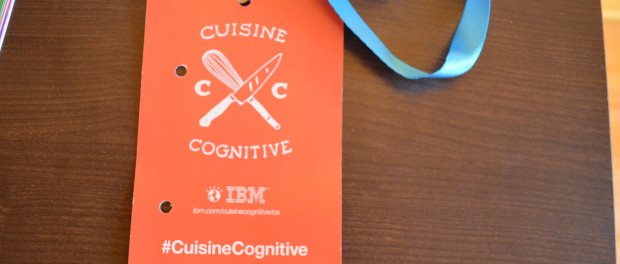The Magic of Cognitive Cooking: Extraordinary Recipes and Wonderful Tastes
La Poutine Week organized the event Cognitive Cooking in collaboration with IBM on Thursday February 5th. People were invited to try poutines for free at l’Auberge Saint-Gabriel between 7 and 11 p.m. However, by 9 p.m., all the poutines had run out. The line-up was long as hundreds of people braved the cold temperatures to try the poutines served in small Asian-food containers.
IBM Watson, a cognitive computer, does many different things in different fields, including cooking. For La Poutine week, chefs executed the poutine recipes suggested from this program. There were five poutines to try out, but people could only choose two. The two most popular ones that quickly ran out were the Canadian-Caribbean Lobster Poutine and the Viet-Thai Green Curry Poutine. The first one had plantain fries, lobster gravy and jack cheese. It was a lightly sweet poutine and the plantain fries were not as chewy. The second one had regular fries, tamarind green curry sauce, Georgian sulguni cheese and an avocado salad with pickled vegetables. It was sweet and spicy with the light curry. Both poutines had uncommon mixes, but it was interesting that it was mixing cultures. The other poutines were Haitian-Greek Veggie Poutine, Italian-Chinese Mushroom Poutine and Moroccan-Lebanese Olive Relish Poutine.
Rick Power, the Watson Solutions Leader from IBM Canada, was present and answered questions people had about cognitive cooking. “IBM gave Watson the history, the science and the psychology of cooking,” said Power. This “program” includes over ten thousand recipes. Some ingredients are used in tandem more often than others. Ethnic or regional cuisine is often determined by the ingredients that pop up frequently in the cuisine. “We helped the system understand what the chemical compounds are to make up those food ingredients,” said Power about “the science” behind all the possible food ingredients.
“The psychology” is how people perceive certain ingredients combined. It might make sense chemically when Watson puts certain ingredients together but if the end result is different, people might not eat it. It depends of the colour or texture. Watson suggests recipes from a classic to unique, so users can decide if they want a safe or an absurd recipe.
IBM Watson partners with the Institute of Culinary Education (ICE) in New York, U.S. where chefs undergoing training try recipes suggested by the program by specifying the ingredients or the type of cuisine.
Check out more coverage of the Montreal food scene at Nicole’s blog: Nick’s Fave Tastes.








